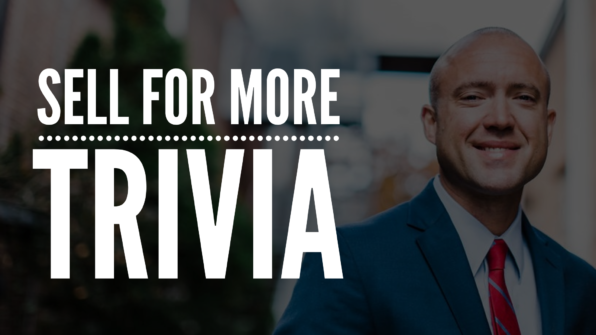Sell for More Trivia is a weekly blog series that playfully presents a trivia question about commercial real estate.
A non-performing note is a mortgage loan in which the borrower is not paying as outlined in the terms of the note. Nonperforming loans encompass borrowers who are at minimum 30 days or more behind on their mortgage…seriously delinquent loans or nonaccrual loans are at 90 days or more delinquent.
An opportunity may present itself
Buying non-performing real estate notes from banks presents a great opportunity, but it’s not without risks.
The Great Recession was fueled by bad loans in the real estate market that turned into non-performing loans for many banks.
Investors could purchase those non-performing real estate loans directly from banks during those troubled times and those deals were beneficial for the banks because they were able to unload non-performing notes from their books while obtaining much needed capital.
Investors were also able to scoop up non-performing notes at discounts. Many of those same investors were then able to foreclose on the properties and ultimately obtain ownership of those properties at a significant discount.
Alternatively, if those investors were paid off, they were generally able to achieve a positive return on their investment due to the default interest that was being charged, as well as other consideration.
Delinquent mortgages are rising
Delinquent mortgages are rising and the COVID-19 pandemic will have a lasting impact. Sectors focused on the tourism, hospitality and retail will likely be hit harder.
Savvy investors can capitalize by purchasing non-performing notes directly from banks looking to unload these assets.
How it works
To properly evaluate the scope of this potential opportunity requires an understanding of what the banks “own” and what they can sell.
In a real estate transaction, when a lender lends someone money, the borrower often pledges the real estate as collateral in exchange for that money, together with a promise to pay the underlying debt plus interest. That is why a borrower is often asked to sign numerous legal documents during a typical real estate closing.
Those documents often include the mortgage and promissory note among other documents, such as an assignment of rents.
Banks are generally not interested in selling their performing mortgages and notes unless your name is Freddie Mac or Fannie Mae.
However, the bank may sell their non-performing notes and mortgages to private investors when the borrower falls behind on their payments for many reasons including:
-
- Excessive cost of foreclosure
- Avoiding known and/or unknown liabilities
- They have less flexibility than private investor in terms of seeking a workout with the delinquent borrower
- Needing capital to satisfy certain regulatory requirements
If you are fortunate enough to have an opportunity to purchase a non-performing note from the bank, you must first conduct due diligence, which an attorney can help you navigate.
Here are some of the issues you and your attorney should tackle:
-
- Request the bank’s entire file and analyze the underlying loan application and loan documents to ensure that the loan is not in violation of any pertinent regulation or law
- Evaluate any appraisal the bank may have
- Evaluate the borrower’s payment history
- Ensure property insurance and taxes are current
- Confirm interest the bank is charging is not in violation of any local rules, regulations, and otherwise not usurious
- Perform title and lien search
- Conduct a market analysis to assess the property’s potential in the open market
- Confer with an attorney experienced in filing real estate related lawsuits associated with non-performing notes to assess the potential cost and length of litigation
- Perform a litigation/background check on the borrower to assess how litigious the borrower may be should a lawsuit be filed
- Physically inspect the property
Buying non-performing notes from banks presents a wonderful opportunity to expand your real estate holdings or make money. But doing so is not without risk, which should be completely understood and evaluated.
With the economy still grappling with the COVID-19 pandemic, those buying opportunities will be ever present in the months ahead.
(FREE PROMOTION) Find out how much your property is worth, for free, before you list it for sale. Get the blueprint to sell your property for the highest price the market will pay (click here)
How to get an unfair advantage. Click here to join Sell for More Club today.
Own a business? 90% of business owners don’t know the market value of their business. If you’re considering selling a business, click here for a free business valuation.
About Beau Beach, MBA CCIM
Beau is a tenacious Commercial Real Estate Broker, author and adoring father of four. His clients appreciate his no-nonsense demeanor and his legendary work ethic.
Beau leads Beachwood which is a commercial real estate broker for sellers in the Nashville, Milwaukee and South Florida markets.
He’s the author of the books The 3 Reasons: Why Most Commercial Properties Don’t Sell and True Wealth: What Every Seller Should Know About 1031 Exchanges.
Beau can be reached at 800-721-3287, click to schedule a call or Beau@soldbybeachwood.com
